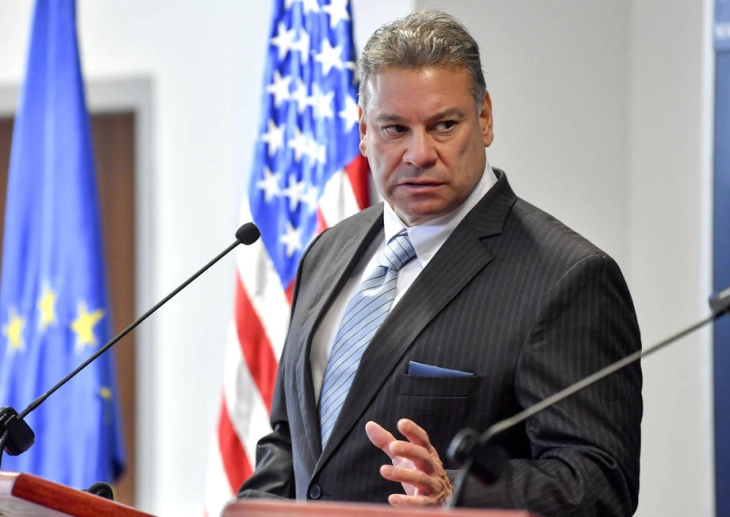Escobar: Not asking people to support the government but to support European path
- I didn't come here to tell people how to vote; we don't do that for NATO allies. What we do is we set expectations, US Department of State's Deputy Assistant Secretary for the Bureau of European and Eurasian Affairs and Special Representative to the Western Balkans Gabriel Escobar told 360 stepeni in an interview done after his meeting with the opposition leader on Friday. "I wasn't here to tell him what to do and I wasn't here to dictate any terms. But I also wanted to make it clear that the US picks its partners in the Balkans based on those who are moving the region closer to Europe, who are showing their commitment to NATO, and continuing the fight against corruption. And that's our expectation."
- Post By Magdalena Reed
- 11:39, 26 August, 2023

Skopje, 26 August 2023 (MIA) — I didn't come here to tell people how to vote; we don't do that for NATO allies. What we do is we set expectations, US Department of State's Deputy Assistant Secretary for the Bureau of European and Eurasian Affairs and Special Representative to the Western Balkans Gabriel Escobar told 360 stepeni in an interview done after his meeting with the opposition leader on Friday.
"I wasn't here to tell him what to do and I wasn't here to dictate any terms. But I also wanted to make it clear that the US picks its partners in the Balkans based on those who are moving the region closer to Europe, who are showing their commitment to NATO, and continuing the fight against corruption. And that's our expectation."
According to the special envoy, the opportunities being presented through the constitutional updates required to move the country's candidacy forward in its EU accession were part of this process of choosing reliable partners.
"I'm not asking people to support the government. I'm asking people to please work with us to support the European path. Because it's going to benefit us, too," Escobar pointed out.
Asked about VMRO-DPMNE's official statement released after the meeting that they were in favor of EU integration but against the constitutional changes required for continuing the negotiations, Escobar said he would like to see the party 'explain that dilemma to the public.'
"We don't know what happens tomorrow. But we know that today we have an opportunity to move North Macedonia's candidacy further and faster than anyone else in the Western Balkans," he said.
"So from a perspective of a close friend, we'd like to see North Macedonia get past this hurdle and start defining itself by its relationship with the transatlantic community, by its relationship to the rest of the world based on its values, and not defined by Bulgaria."
Escobar reiterated the international community's support for the Macedonian identity and language. He also said he had personally talked to Bulgaria's foreign minister Mariya Gabriel and she had assured him that if North Macedonia did what was outlined in the current agreement, there would be no other conditions set by Bulgaria.
"After this, what will define your accession process is not the bilateral issues but the closing of chapters and the convergence of your economy with the greatest economy in the world."
Earlier in the interview, Escobar said he wanted "to convey the same level of enthusiasm that he wanted to convey to the people of North Macedonia" that the country's future was in the EU.
"There are huge opportunities for North Macedonia to join the EU," he said. "It is the largest trading bloc in the world and also America's largest trading partner. There are four billion dollars a day that are crossing the Atlantic and we want you to be part of that. So it's that enthusiasm for what North Macedonia can contribute to Europe that I wanted to convey to everyone in my meetings," he said.
Besides with VMRO-DPMNE's Hristijan Mickoski, the US Department of State's Deputy Assistant Secretary for the Bureau of European and Eurasian Affairs during his two-day visit to the country met with President Stevo Pendarovski, Prime Minister Dimitar Kovachevski, and Foreign Minister Bujar Osmani.
In response to a question on whether a snap election would solve the current political deadlock, Escobar said it was not for the US to determine this but for the people of North Macedonia to determine.
"I do hope that the people understand what a tremendous opportunity they have in front of them and to take advantage of that. I do hope they send a signal to the leaders of North Macedonia that they want that quickly and they want that now so that we can begin building that structure so that North Macedonia is fully and formally part of every Euro-Atlantic structure. Because that's where we want you," he said. mr/







